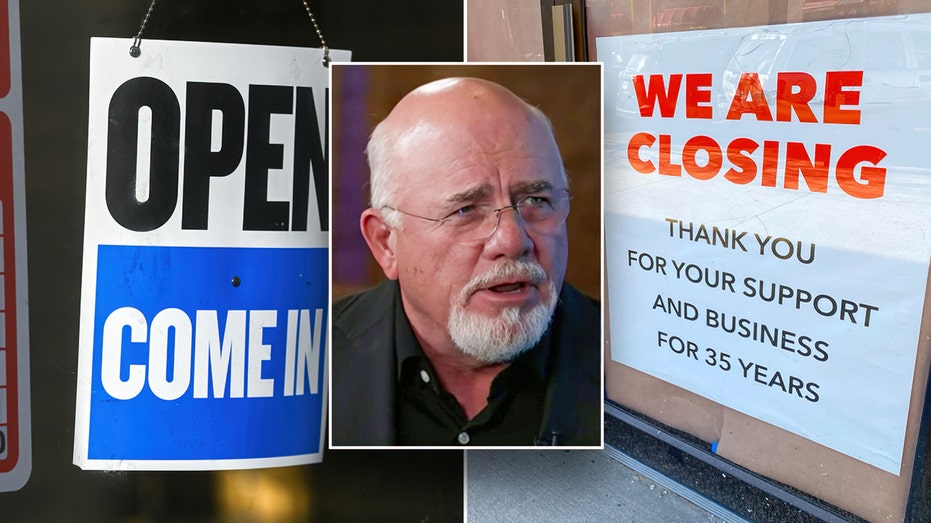Small businesses are statistically the backbone of the American economy. But even personal finance guru Dave Ramsey points out that it’s a tough time to embark on an entrepreneurial journey.
"It's emotionally difficult right now. It is very hard right now," Ramsey told "The Big Money Show" co-host Brian Brenberg, on Monday, at the EntreLeadership Summit in Dallas, Texas.
"And guess what? It always has been," the Ramsey Solutions founder expanded. "If you were in the 70s, you had the Vietnam War, right? If you were in the 80s, you had inflation. You just name it, there's always something telling you not to do it."
Data from Forrester showed a surge of younger generations scooping up existing small businesses, with 64% of all buyers being born after 1980 as of February 2023. Despite the spike, Forbes reported this January that Boomers and Gen X still own the majority of U.S. small businesses, at a combined 87%.
Last August, a poll of 50,000 American business owners showed only 4.5% of respondents were considering growing or expanding their business over the next year.

Ramsey reacted to the idea that aging and retiring owners may potentially be setting up a golden opportunity for a generational handoff.
"The millennials and Gen Zers are the buyers. And you've got a huge opportunity, possibly to start your own thing. You may not need to be a buyer, you may just want to start something from the ground up," Ramsey told future business leaders. "So you kind of keep that in your back pocket while you're doing the negotiation."
"And for the boomers, hey, don't be a control freak. Bless the next generation," he continued. "Turn them loose. They're capable. They can do it."
Texas parents credit Dave Ramsey after charging 19-year-old daughter rent
Ramsey Solutions founder Dave Ramsey argues the daughter is now 'well-prepared for life' because the parents decide to charge rent.
Though previously showing some tough love to younger generations for their criticism of his money management tips, Ramsey admitted they’ve taken advantage of the "easiest" and "best" ways to get ahead in business.
"You've got YouTube and podcasting, and all of it's free," he said. "From an economic standpoint, you can come and go quickly, easily, you can iterate, you can change, and it's all digital. You don't have to throw it all in the dumpster if you did it wrong."
With reportedly between 400 and 500 Gen Z employees at Ramsey Solutions, the financial firm’s patriarch shared words of encouragement for what he’s learned to be a "wonderful" workforce.
GET FOX BUSINESS ON THE GO BY CLICKING HERE
'A New Kind of Diversity' author and Growing Leaders President Tim Elmore discusses 'bridging the gap' culturally between Gen Z and their elder generations in the workplace.
"They're wonderful because they're very serious, and they're very practical and tactical. They're not heads in the clouds, they're not all dreamy. They're like, ‘I want to get it done,’" Ramsey said of their attitudes.
His best advice for younger workers, though, is to go into mixed-collar trades – otherwise, they "can get a four-year degree in German polka history and be a barista."
Emails are stressing out workers, and the youngest people in the office are feeling the most pressure.
A majority of people say the volume of work emails they get each day is stressful, according to a recent survey of 2,000 U.S. office workers from Babbel, the language learning platform. But Gen Z workers ages 18 to 24 are the most likely to let those messages pile up.
More than a third, 36%, of Gen Z workers say they have over 1,000 unread emails in their inbox, compared with 18% of office workers overall.
They’re also more likely than other age groups to say they’ve sent an email they regret, with 1 in 5 Gen Z professionals saying they “very often” regret the emails they send.
“From our findings, Gen Z appears to struggle the most with email stress and stacking up a huge quantity of unread emails due to a combination of factors,” says Esteban Touma, a linguistics and culture expert at Babbel.
“Gen Z’s communication preferences are heavily influenced by the prevalence of instant messaging platforms and social media,” he says. Platforms like Snapchat and Instagram, for example, prioritize instantaneous communication, informality, and visual cues.
On the other hand, “the structured and formal nature of email communication may feel unfamiliar and more complicated to many [Gen Zers],” Touma says.
Differences in communication styles can fuel burnout
Those misaligned expectations and experiences with communication styles, whether through email, instant messaging, or live, can have a big impact on employee engagement. In some cases, it can fuel burnout.
Keely Antonio, 25, says communication challenges contributed to her feelings of burnout at her first corporate job. She began working part-time for a retail company during her senior year of college and quickly took on big client meetings and sales goals. The role looked good on paper, but “I felt like I didn’t have the tools to manage the stress,” she tells CNBC Make It, especially as she neared graduation in 2020.
One culprit? “I didn’t feel like there was a streamlined method of communicating in that organization,” she says. Emails felt outdated and too clunky to deliver real-time feedback and support, and other forms of communication were lacking.
Tools like faster and more casual communication channels could have made it easier to speak up at the moment and address her needs, she says. She declined a post-graduation offer to join the company full-time despite a $100,000 salary “because the working environment lacked the supportive atmosphere necessary for sustainable well-being.” Antonio went on to co-found FeelSwell Experiences, which consults with companies how to attract and engage Gen Z workers.
Touma cautions that a work culture that overly emphasizes immediacy isn’t a great solution, either. An expectation to respond quickly to emails and other messages “can blur the boundaries between work and personal life,” he says. “This constant connectivity can contribute to heightened stress levels and feelings of being constantly tethered to work obligations.”
Young workers have a harder time setting boundaries
Workplace leaders must set, communicate, and model expectations around response times for messages and emails, especially for younger workers who are new to the workplace, Touma says: “Unlike older generations who may have developed strategies for compartmentalizing work and personal communication, Gen Z may struggle to establish boundaries.”
As for setting better boundaries around work emails, Touma recommends responding to urgent messages within an hour or two. For things that aren’t time-sensitive, responding within 24 hours is “considered courteous and professional.”
To tame your inbox, he recommends first setting up filters to automatically sort emails by urgency and topic, so you know what needs an immediate response and what can be addressed later.
Second, set specific times to check and respond to emails to prevent constant interruptions throughout the day.
Finally, unsubscribe from any irrelevant email lists and newsletters.



